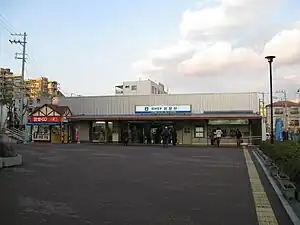Iwaya Station 岩屋駅 | |||||||||||||||||||||
|---|---|---|---|---|---|---|---|---|---|---|---|---|---|---|---|---|---|---|---|---|---|
 Iwaya Station | |||||||||||||||||||||
| General information | |||||||||||||||||||||
| Location | 2, Iwayakita-machi 4-chōme, Nada, Kobe, Hyōgo (神戸市灘区岩屋北町) Japan | ||||||||||||||||||||
| Coordinates | 34°42′15″N 135°13′04″E / 34.704082°N 135.217838°E | ||||||||||||||||||||
| Operated by | Hanshin Electric Railway | ||||||||||||||||||||
| Line(s) | Main Line | ||||||||||||||||||||
| Connections |
| ||||||||||||||||||||
| Other information | |||||||||||||||||||||
| Station code | HS 30 | ||||||||||||||||||||
| History | |||||||||||||||||||||
| Opened | 1905 | ||||||||||||||||||||
| Passengers | |||||||||||||||||||||
| 2007 | 9,804 daily | ||||||||||||||||||||
| Services | |||||||||||||||||||||
| |||||||||||||||||||||
Iwaya Station (岩屋駅, Iwaya-eki) is a railway station of Hanshin Main Line, in Nada-ku, Kobe, Hyōgo Prefecture, Japan, between Nishi-Nada Station and Kasuganomichi Station.
Overview
Layout
- There are a side platform and an island platform serving a track each in a trench.
| 1 | ■ Main Line | for Koshien, Amagasaki, Osaka (Umeda), Namba, and Nara |
| 2 | ■ Main Line | for Sannomiya, Kosoku Kobe, Akashi, and Himeji |
Surroundings
The station is located near Nada Station of JR Kōbe Line (Tōkaidō Main Line) and is an entrance to Hyogo Prefectural Museum of Art, Hyogo International Center of JICA, WHO Centre for Health Development and Disaster Reduction and Human Renovation Institution.
History
Iwaya Station opened on the Hanshin Main Line on 12 April 1905.[1]
The tracks to the west of the station were moved underground in 1934.[1]
Service was suspended owing to the Great Hanshin earthquake in January 1995. Restoration work on the Hanshin Main Line took 7 months to complete.[1]
Station numbering was introduced on 21 December 2013, with Kasuganomichi being designated as station number HS-31.[2]
Gallery
 Station entrance
Station entrance View of the platforms in January 2013
View of the platforms in January 2013
References
- 1 2 3 兵庫の鉄道全駅 私鉄・公営鉄道 [All railway stations in Hyogo Private railways and public railways] (in Japanese). Japan: Kobe Newspaper General Publishing Center. 2012. ISBN 9784343006745.
- ↑ "阪神「三宮」を「神戸三宮」に駅名変更のうえ、駅ナンバリングを導入し、全てのお客さまに分かりやすい駅を目指します" [After changing the station name from Hanshin "Sannomiya" to "Kobe Sannomiya", Introduced station numbering, Aiming for a station that is easy for all customers to understand] (PDF). Hanshin News Online (in Japanese). 30 April 2014. Archived (PDF) from the original on 10 April 2021. Retrieved 26 February 2022.